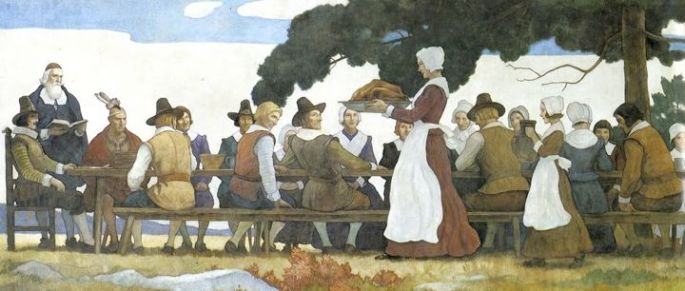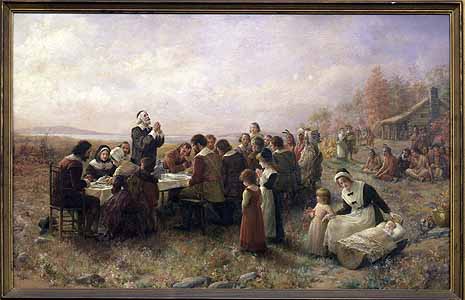“The Farmer thought that it would be more becoming the gratitude they owed to the Divine Being, if, instead of a fast, the people should proclaim a Thanksgiving.”
–Ben Franklin, Richardson American School Reader, 1810
 What do you think about when you hear someone mention Thanksgiving (besides a three-day school holiday)? Does it bring you to a memory of a Turkey/Tryptophan induced nap on the family couch? — as a side question can Tryptophan put you to sleep? — Maybe it reminds you of putting in the work Wednesday night so you can present your family with feast made for royalty; preparing turkey stuffed with seasoned breadcrumbs, cranberries (relished or not), mash potatoes, and pumpkin pies*. Or, perhaps, it reminds you of sitting around a fire or TV with your family, enjoying a day free of work and class. What should remain consistent in your memory of Thanksgiving, however, is that it is day when families get together and sit down to enjoy each other around a Turkey-based feast. But, was it always this way? Was the purpose of Thanksgiving, to get together with you family or did it start as something different?
What do you think about when you hear someone mention Thanksgiving (besides a three-day school holiday)? Does it bring you to a memory of a Turkey/Tryptophan induced nap on the family couch? — as a side question can Tryptophan put you to sleep? — Maybe it reminds you of putting in the work Wednesday night so you can present your family with feast made for royalty; preparing turkey stuffed with seasoned breadcrumbs, cranberries (relished or not), mash potatoes, and pumpkin pies*. Or, perhaps, it reminds you of sitting around a fire or TV with your family, enjoying a day free of work and class. What should remain consistent in your memory of Thanksgiving, however, is that it is day when families get together and sit down to enjoy each other around a Turkey-based feast. But, was it always this way? Was the purpose of Thanksgiving, to get together with you family or did it start as something different?
Continue reading to go back in time and learn the about origins of Thanksgiving.
*Looking for new ideas … check out these Thanksgiving recipes from magazines such as Good Housekeeping found by using the Library databases.
The Legend of the First Thanksgiving (Autumn 1621)

Remember the story of the “First Thanksgiving”, where the heroes, Pilgrim settlers from the Mayflower, fled the religious persecution of England to settle in the New World (more specifically, Plymouth Rock). For the first four years things were not easy for the world-bound adventurers, as winters and low crop yields nearly finished off the settlement. That is until, 1621, when the Native American tribe, the Wampanoag, decided to help out their fledgling neighbors. According to legend, this effort was spearheaded by Squanto, a Native American, who was taken to England in his youth, thus, was able to speak the language fluently. With the help of the Wampanoag, the settlers learned to plant maize along with hunt the native animals. In 1621, the Pilgrims of Plymouth had themselves a bountiful harvest and as a measure of thanks invited their neighbors threw a three day feast, where both the natives and the Pilgrims dined on venison, turkey, geese, clams, eels, and maize. But did this festival begin the tradition that we have come to know as Thanksgiving? Some people would argue, no … the holiday of Thanksgiving did not originate on one day, during one year, in one place, but took time and cultural changes to slowly grow into existence (Sigal, 1999).
The Religious Origins of Thanksgiving
Thanksgiving did not start as a secular holiday, in fact, the roots of the holiday are actually heavily influenced by religion. If you don’t believe me, take a look at its definition … (go on I’ll wait) …. Bound to words such as “divine favor” and “thanks to God”, you wouldn’t believe that a holiday with the name Thanksgiving could possibly every be secular, could you? Anyway, lets look at a couple religious traditions that influenced Thanksgiving.
Sukkoth

Sukkoth, also known as “The Festival of Tabernacles”, is one of the three Jewish Pilgrim holidays and starts five days after Yom Kipper (usually in September or October). The holiday is a seven day long feast that celebrates both this year’s harvest along with the God’s deliverance of the Israelis from Egypt. Now the Puritans, who came to Plymouth Rock in search of religious freedom, felt a very close kinship with the Israelis, because, like the chosen people, they felt that God led them from tyranny to the Promised Land. So, after a year of deprivation and hunger in this New World, they saw the abundance of harvest in 1621, as God blessing them as he blessed the Israelis, and thus began a new redemptive Thanksgiving festival, modeled off of Sukkoth, praising God for his gifts.
The Harvest Home Festival

The Pilgrims also brought to the New World, The Harvest Home Festival, also known as “The Festival of Ingathering”, which was a British tradition held in September that dated back to the festivals held in the honor of the Roman goddess Ceres. During this time, towns would celebrate the harvest by decorating the town with boughs and by throwing feasts where party-goers would sing and shout at. During this festivals, Harvest Dolls would be made by townsfolk, community harvest meals would be served, dances would be held, and a Harvest Queen would be chosen.
Becoming a Holiday

While 1621, gets the distinction of being the “First Thanksgiving”, it was actually not repeated annually. In fact, the same community only held one more Thanksgiving, two years later when a prayer for rain was granted in the midst of a drought. In the whole of America, Thanksgiving-ish feasts would happen sparsely and had no coordination from colony to colony. Some would happen due to victories in battle, such as the Thanksgiving of 1777, which honored the military defeat of the British at the Battle of Saratoga or during times that a President felt the nation needed healing (like the Thanksgiving Day, George Washington held after the Whiskey Rebellion). By the end of the 18th century, most of the New England colonies held some form of an annual autumn festival, usually falling on a Wednesday or Thursday. These days began with church services that would be followed up with recreational games, family reunions, and abundant dinner festivals. The nights would end, again, in a church service. However, the proclamation of these festivals would be up to the colony’s Governor, and thus would be inconsistent from colony to colony. George Washington made one attempt to standardize the festival in 1789, but was loudly shouted down by Thomas Jefferson, who felt that it was a religious festival, and that the government had no business dealing with religion of any kind.
In 1827, the editor for the widely read Goedy’s Lady Book and author of Mary had a Little Lamb, Sarah Joespha Hale, decided to take up the cause for making Thanksgiving a national holiday. She would not see the fruits of her labor, however, until 36 years later, after the Battle for Gettysburg, when Abraham Lincoln, sensing a need for national healing, declared August 6th to be a National Day of Thanksgiving. Hale would eventually come around to convincing Lincoln to change the day to sometime in November, so it could sync up with the New England States’ holiday festivals. In 1941, the 77th United States Congress would make the fourth Thursday in November, legally, Thanksgiving.
Things Just Got Secular

So how did we go from a nation who celebrated Thanksgiving as a communal celebration of the harvest that God delivered to a nation who gets together with family and give thanks for the good things in our life, while eating turkey and watching football? In her article, Thanksgiving: Sacred or Profane Feast?, Lillian Sachs argues several of reasons that led to the secularization of Thanksgiving Day.
- The Industrial Revolution led to the idea that families and homes were a safe refuge away from the Industrial World which shifted the focus of the communal aspect of Thanksgiving to one where one spends oneself with family.
- The Urbanization of America created less farmers, so the aspect of celebrating the harvest was replaced by the urban Middle Class with a focus on families and a demonstration abundance with gratuitously displays of food.
- The holiday’s focus change from religious to civic when Lincoln declared it a national holiday. As the United States built up a stronger national identity, Thanksgiving, grew, more in accordance with being tied to that identity.
Eventually, in 1924 Macy’s would begin its annual Thanksgiving Day Parade, which would be followed by the 1935 decision of the Detroit Lions to hold an annual football game on the fourth Thursday of November. Those two occurrences would eventually be one-upped by the advent of Black Friday, a consumer-created holiday wherein companies held huge sales on the day after Thanksgiving to lure in families in need of Christmas presents on their day off of work.
At its heart, though, Thanksgiving is still a day that, through the sharing of customary practices handed down from those who came before us, we can connect to the past and evoke a nostalgia for our history while enjoying a day full of good food and family.
Happy Thanksgiving!
References:
Brownscombe, J. (1914). The First Thanksgiving. Retrieved from ArtSTOR.
Franklin, B. (1931). Thanksgiving. Saturday Evening Post, 204(21), 20. Retrieved from EBSCOhost.
Gutekunst, F. (1867). The Harvest Home When the War was Over. Retrieved from ArtSTOR.
Picart, B. (1724). Sukkot: Portuguese Jewish Procession of Palms. Retrieved from ArtSTOR.
Rockwell, N. (1943). The Freedom from Want. Retrieved from ArtSTOR.
You can now celebrate Thanksgiving with your cell phone. Check out this article by Scientific American … http://bit.ly/v7N9GI
Check out this article from Time Magazine about the top 10 things you didn’t know about Thanksgiving … http://ti.me/uXVA32
My favorite was the invention of TV dinners.